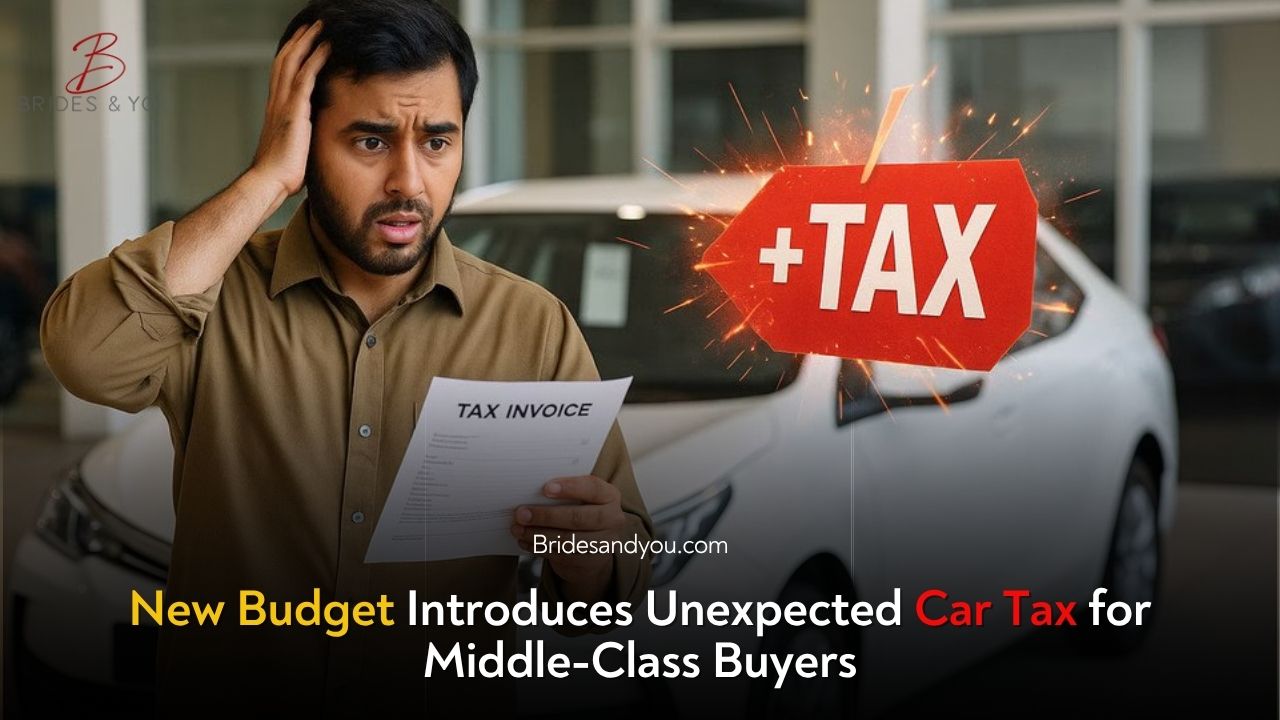Now Reading: New Budget Car Tax 2025 Shocks Middle-Class Car Buyers in Pakistan
-
01
New Budget Car Tax 2025 Shocks Middle-Class Car Buyers in Pakistan
New Budget Car Tax 2025 Shocks Middle-Class Car Buyers in Pakistan

Pakistan’s 2025–26 federal budget has brought an unexpected blow to middle-class car buyers. A newly proposed 1% NEV (New Energy Vehicle) Adoption Levy is set to increase the prices of some of the country’s most commonly purchased petrol-powered vehicles. The New Budget Car Tax 2025 directly targets cars with engine capacities between 660cc and 1300cc — a category dominated by middle-class buyers seeking affordability and reliability.
This new tax, although just 1%, is raising eyebrows across the auto industry and among consumers who were already dealing with high inflation and rising car prices.
What is the New Budget Car Tax 2025?
The New Budget Car Tax 2025 refers to the 1% NEV Adoption Levy introduced in the federal budget. It’s designed to support the development of electric vehicle (EV) infrastructure in Pakistan. The tax is applicable to petrol-powered cars within the 660cc–1300cc engine range — the most common segment for first-time and middle-income car buyers.
While the tax rate seems minimal, its impact is significant. It will be applied to the ex-factory price of vehicles, not the on-road price, subtly increasing costs without much visibility on dealer invoices.
The goal? Shift the population slowly but surely toward more environmentally friendly alternatives — EVs — by making conventional internal combustion engine (ICE) vehicles just a bit less appealing.
How Much Will Car Prices Increase?
Here’s a breakdown of how this seemingly small tax will affect popular models:
| Car Model | Old Price (₨) | New Price with Tax (₨) |
|---|---|---|
| Suzuki Alto VXR | 2,827,000 | 2,855,270 |
| Suzuki Alto VXR AGS | 2,989,000 | 3,018,890 |
| Suzuki Alto VXL AGS | 3,140,000 | 3,171,400 |
| Suzuki Cultus VXR | 4,230,000 | 4,272,300 |
| Suzuki Cultus VXL | 4,316,000 | 4,359,160 |
| Suzuki Cultus AGS | 4,618,000 | 4,664,180 |
| KIA Picanto 1.0 AT | 3,940,000 | 3,979,400 |
| Honda City 1.2L M/T | 4,649,000 | 4,695,490 |
| Honda City 1.2L CVT | 4,689,000 | 4,735,890 |
| Peugeot 2008 Active | 6,600,000 | 6,666,000 |
| Peugeot 2008 Allure | 7,250,000 | 7,322,500 |
These changes are enough to affect affordability, especially for families who had already stretched their budgets to buy a small car.
Why Is the Government Introducing This Tax?
Government officials have clarified that this levy is not just a revenue move — it’s a strategic shift toward environmental reform. Pakistan, like many countries, is under pressure to reduce carbon emissions and modernize its transportation sector.
By taxing traditional petrol cars and channeling that revenue into electric vehicle (EV) infrastructure, the government is attempting to:
- Encourage EV Adoption: Make petrol vehicles incrementally more expensive to nudge people toward EV options.
- Fund Green Infrastructure: Use collected levies to install EV charging stations and support local EV production.
- Meet Climate Goals: Contribute to the reduction of carbon emissions by reducing dependency on fossil fuels.
While the tax seems small, its long-term policy intent is to reshape the vehicle market in Pakistan.
Impact on the Middle-Class Car Buyer
The New Budget Car Tax 2025 puts more pressure on middle-income buyers who are already coping with a challenging economy. Petrol car prices have been increasing due to currency fluctuations, freight charges, and taxes. Now, this 1% levy makes it even harder for many families to afford new vehicles.
Buyers may now have to consider:
- Opting for older, used models.
- Postponing their vehicle purchase.
- Exploring entry-level electric vehicles if available.
Ultimately, this shift could result in a gradual decline in small petrol car sales — exactly what the policy aims to achieve, but at the cost of middle-class affordability.
Conclusion
The New Budget Car Tax 2025 has taken many by surprise, particularly middle-class car buyers who were planning to invest in a vehicle this year. While the tax may be modest in numbers, its ripple effects will be felt throughout the auto market. The policy direction is clear — Pakistan is gearing up for an EV future, and this tax is one of the first steps.
But for now, buyers of conventional small petrol cars will have to dig a little deeper into their pockets.










